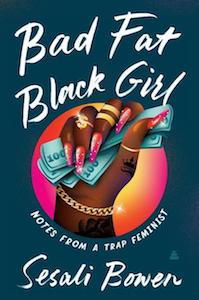
On the Unattainable Myth of Feminine Beauty Ideals and Our Culture of Fat Phobia
Sesali Bowen Considers What It Means to Be a "Bad Bitch" and the Politicization of Attractiveness
I’m fat. Let’s start there. Not only am I fat, the ancestors saw fit to deny me the proportions that are so frequently admired in other Black women. Rather than collect my excess in rounded hips and ass, most of it has decided to settle in my arms, back, and what I affectionately call my tire: the circumference around my lower abdomen, which includes the space above where my ass crack ends and my sagging belly. “Flat” is an understatement when describing my ass. My butt is more square shaped than anything else, and from certain angles it appears to be actively trying to squeeze itself into the rest of me, perhaps hoping even after all of these years to get some of the jiggle the rest of my body has in abundance.
I’m tall—not WNBA tall, but at five foot eight, I’m taller than most women—and my legs didn’t seem to get the memo about what size the rest of my body wanted to be. If I’m a size 22 up top, I’m a size 18 in the legs. For the sake of comparison, it was once said on Facebook that I’m shaped not unlike a wisdom tooth. On my more disparaging days I feel boxy. When I’m feeling more gracious and accepting, which is the majority of the time, I settle on “wavy” as a good descriptor of what I look like. It’s more than curvy but soft and jiggly. According to the kids (by “kids,” I mean folks of all ages who body-shame on the internet), I’m “built bad.”
I’ve always been fat. I didn’t get pregnant or have a medical condition that caused me to gain weight. My metabolism didn’t slow down as I got older, causing my weight to suddenly skyrocket. I was called Buddha Baby when I was an infant because I was so round and damn near bald. There’s a picture of me sitting on top of one of my granddaddy’s Cadillacs, not even a year old yet, with the strap of my summer onesie falling off one shoulder and exposing a whole infant boob. In fourth grade, I wore a stretchy knit dress that touched my ankles along with my first pair of chunky, platform heels (if two and a half inches count as heels). I felt sexy and cool, like the sixth Spice Girl. Seeing me in the getup, my granny couldn’t contain her laughter or her assessment that I actually looked like “a stuffed sausage.” My body has always been in excess of what is deemed acceptable and appropriate, and outside what we’re told is sexy and pretty. In elementary, middle, and high schools I was one of the fat kids. It was a sin made worse as I aged, and instead of acclimating, I just became more wavy. I have been reminded of this failure often and loudly.
There is a myth that Black people aren’t fat phobic—and Bigger Black women, by extension, are confident and unaffected by their size—and we need to put that to rest right now. Generally speaking, Black people do have a higher tolerance for body fat on feminine bodies than other groups do. We like our women to have “some meat on their bones,” “something to grab on to,” or to put it plainly, we like them “thick.” But thick and fat are not the same thing. The difference between being a “big fine” and just being “big” has as much, if not more, to do with body shape as it does with body mass.
A woman twice my weight can still be stamped “bad bitch” if she carries her weight everywhere but her midsection. Hourglass and pear-shaped women are typically celebrated amongst Black folks and idolized in trap music. Young Dolph said, “If she ain’t got a fat ass, then she can’t get up in this car.” Describing a girl he shouldn’t have to fuck “for free,” Drake said her “stomach on flat flat… ass on what’s that.” I could go on for days, but you get where I’m heading here. There is a formula for what makes a bad bitch, and it starts with an impressive hip-to-waist ratio. Right beyond that, though, are the familiar trappings of fat phobia.
You ever peep how many exceptions to the hourglass standard are made for Black girls who are thinner? Think: Rihanna, Ciara, Halle Berry, Tyra Banks, or any of the unshapely, skinny light-skinned girls you went to school with. We call those women who are shaped less like hourglasses and more like the hour hand on a clock “slim thick” or “model material” and keep it moving without comment. Have you ever noticed that there are no such concessions made for fat Black girls, ever? White beauty norms will always find themselves a seat at the table, even ours, and that includes vicious fat phobia. If you’re a Black girl like me, with the misfortune of being both fat and “built bad,” existing outside the aesthetic rules means that you’ve committed an egregious act against the social order. Women who find themselves too far away from the center of beauty norms are often treated as if they’ve committed treason, our aesthetic a public-facing betrayal of our refusal to conform, our refusal to go to any lengths necessary to be valuable to society—specifically, to its men.
Beauty is a politicized concept precisely because it maintains what bell hooks calls “imperialist, capitalist, white supremacist patriarchy,” a system of oppression that gives all of us something to aspire to. As such, sexism simultaneously serves the interests of men and capitalism by assigning value to only those women who are read as beautiful by cultural gatekeepers. It creates a culture in which women are taught to lead with their bodies, to remain open to their bodies being judged at any moment and all moments, and to internalize those judgments as commentary on their place within the culture. Rewarding and praising women who meet these standards, while shaming or erasing those who don’t, in turn, reinforces the masculinity and heterosexuality of the men around them because the presumed desires of men are the litmus test.
In order to formalize and institutionalize this process, feminine beauty has become an actual form of capital and currency that everyone gets to leverage, directly or indirectly, depending on their level of privilege. The thing about any ethos is that much of it relies on some “mythmaking”: a top-line, fantasy version of events has to exist in order to set the standard for everyone else to aspire to. This narrative is typically what serves white supremacist capitalist sexism the best. It’s the center of a wheel, and those closest to that center benefit the most from it, creating an optic of exclusivity and inaccessibility that helps keep those on the margins the most disenfranchised, despite the fact that we do so much work to keep the shit spinning.
Trap culture is heavily invested in the ethos of bad bitches only. Here achieving feminine beauty comes with the promise of access to wealth, love, happiness, and autonomy. A bad bitch on a nigga’s arm, then, is meant to send a message about his financial and social status, his style, and even his manhood. This is part of the reason why girls like Lira Galore, Miracle Watts, Bria Myles, and Alexis Skyy—all of them with fat asses, flat stomachs, and millions of followers on Instagram—become celebrities in their own right. They represent an explicitly feminine version of a Black American dream that puts them in league with the rich and powerful just because of the presumed influence that accompanies their serpentine frames.
Women who find themselves too far away from the center of beauty norms are often treated as if they’ve committed treason.
Bad bitches are supposed to make niggas move differently in their pursuit of them. They are the exceptional creatures who can temporarily pull niggas away from their more pressing matters, like making money and supporting their friends and family. Bad bitches are their hobby, a recreational activity that comes with the territory of being coined up and widely respected. In almost every version of the trap ethos, niggas open their wallets and dole out gifts in the form of big Chanel bags for bad bitches to carry around in all different colors; brand-new Range Rovers for bad bitches to drive to spas and Gucci stores; designer clothes and expensive lace-front wigs for bad bitches to wear; diamond jewelry that makes bad bitches look more expensive; and cosmetic surgery procedures that make bad bitches even badder. If she’s both a bad bitch and conveniently loyal to him, he may even soften a little bit emotionally. In these cases, bad bitches get the love and loyalty of men who have been socialized not to give either. But there is no happily ever after, or even once upon a time, without a body that serves this narrative.
So what happens to women like me, who upon first glance aren’t what most people would call a bad bitch? According to the ethos, women who don’t live up to the feminine ideal—your basic bitches, your ugly bitches, and especially your fat bitches—signify struggle, poverty, poor taste, and lesser value. In any version of the story, they don’t exist or have any access to men who can provide the blessings that bad bitches get. I’ll never forget how this rhetoric showed up when Usher, the veteran R&B singer I’ve loved since I was a little girl and an artist who has committed to maintaining trap-music influences in his music, was involved in a sex scandal in 2017. Court documents were leaked that revealed he’d settled a lawsuit for over a million dollars with a woman who accused him of exposing her to genital herpes. After the news went public, more women lawyered up and came forward with their own accusations against the singer, and one of them was a fat woman named Quantasia Sharpton.
When women come forward about being wronged in any capacity by men they’ve slept with, especially men who are rich and powerful, the general public rarely rushes to their defense. When it comes to these kinds of men, the ones who hold the keys to millions of hearts and millions of dollars, women who find themselves in their company are expected to be happy about it. I expected some distrust toward anyone who said they’d had regrets about fucking the dude who made “Nice & Slow,” but it was different for Quantasia. I scrolled in horror as Twitter and Instagram had a field day with memes and jokes based on the perception that her body was proof of a lie, because someone like Usher would never fuck her. As the story continued to play out in the media, representatives for Usher’s team reached out to TMZ to officially deny the accusations by echoing the sentiment that my good sis was not his type. His previously demonstrated taste in women, and not his medical records, were meant to put the whole matter to rest.
This dissonance was familiar to me. As a fat girl in middle school and high school, many of my interactions with boys were soiled by these body politics. Most boys in my peer group wouldn’t be caught dead giving me a compliment. Some of them would make fun of each other by suggesting the other one was attracted to me. I’d walk down a hallway, or past a group of them on the street, and one of them would say to the other, “That’s you right there.” I’d hold my breath for the inevitable laughter from the others. Because not enough boys are taught how to value women they don’t find attractive, even the possibility of friendship was aggressively rejected by boys still trying to put together their own fragile masculine identities.
__________________________________

Excerpted from Bad Fat Black Girl: Notes from a Trap Feminist. Reprinted with the permission of the publisher Amistad, an imprint of HarperCollins. Copyright © 2021 by Sesali Bowen.
Sesali Bowen
Sesali Bowen is a writer who curates events, writes for film and television, and creates elevated pop culture correspondence. Bowen is the former senior entertainment editor at Nylon magazine and senior entertainment writer at Refinery29.



















